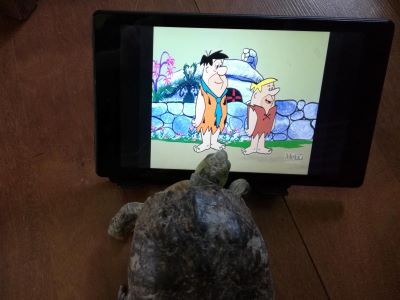
Good Natured: Box Turtles are Gifts that Keep On Giving
I watched in amazement the other day as my buddy Arthur wolfed down his plate of sweet potatoes. They were made just the way he likes them—baked, no butter, with just a bit of the skin left on. And as he gulped down bite after bite I thought, “My goodness, it's like he hadn't eaten in days!"
Then I thought some more, and realized it really had been days since he'd eaten. Three, to be exact. But that's okay. Because Arthur's an ectotherm. That is, he's cold-blooded, so his feeding requirements are quite different from ours. Arthur, you see, is an ornate box turtle.
Artie and I met on Columbus Day 1978, at a pet store that was then at the Fox Valley Mall in Aurora. I'd wanted a pet turtle for a long time and, that day, my folks finally gave the okay. That I had a learner's permit and could drive myself to the mall--with my white-knuckled mom riding shotgun--made the day all the more special.
He was in an enclosure with lots of other box turtles, and when his eyes (fire-engine red, a trait of male box turtles) met mine, I knew he was the chelonian for me. When I picked him up he hissed, in effect sealing the deal. Thirty-one years later we're still together, a girl and her turtle.
But Artie's story also has an element of irony. Because, had I known then what I know now, I probably wouldn't have gotten him.
Box turtles—in fact, turtles of many species—are in a tough spot these days. Over our years together, Artie and I (well, mostly I) have watched the Illinois status of his species, Terrapene ornate, in downgrade to Threatened, meaning there is a very real threat to their existence. Several years ago I had to apply for permit to possess Arthur and now I--well, actually we—are officially listed with the IL Department of Natural Resources.
Habitat loss has hit turtles hard. And, as more and more roads traverse their home ranges, more and more are getting hit by cars. But these long-lived reptiles also have suffered huge losses thanks to the very means that brought Artie to me: the pet trade.
Illinois law now prohibits the sale of any wild-caught amphibian or reptile, as well as their eggs, offspring or parts. But many other states haven't been so progressive.
With the December holiday season in full swing, you or someone you know may be considering giving or getting the gift of a pet turtle. While that may seem like a fine idea, just be sure you or the intended recipient knows what lies ahead.
For one thing, turtles live a long time. A really long time. Artie was no kid when I got him and, all these years later, he's still going strong. With box turtles, life spans of 50 years or more are the norm, not the exception. For other species, such as red-eared sliders, average life expectancy is maybe 35 years—less than a box turtle, yes, but still considerably longer than the 3 or 4 years you can expect from a hamster or gerbil. And if you're thinking, “We'll just give it to a nature center when we're done with it…" think again. Nature centers and zoos have all the turtles they can handle. When you get a turtle as a pet, be prepared to be committed to it for decades to come.
Of course this longevity is contingent on proper care—a balanced, species-appropriate diet, clean water, a temperature gradient that allows both basking and cooling, as well as a light source that supplies both UV-A and UV-B rays. For aquatic species, don't forget to factor in a large aquarium or indoor pond along with a heavy-duty filtration system. None of this comes cheap.
Also keep in mind a turtle's adult size. If you're looking to acquire, for example, a red-eared slider, and pick out one the size of your palm, it's probably still a youngster. Female RESs, which typically grow larger than males, can measure a foot or more as adults. That 20-gallon aquarium that seems adequate for young Shelly will soon be way too small.
Finally, inquire as to where the turtle you're interested in originated. Don't accept “wild caught" as an answer; “captive bred" or “rehomed" is what you want to hear. If no captive breeding programs exist for the species you're interested in, check web sites like PetFinder.com or clubs like The Chicago Herpetological Society, which has an active adoption program for turtles (and lots of other reptiles) in need of new homes.
Turtles can make fine pets, but they're a decades-long commitment. A life span of 35, 40, 50 years or more is a long time. Just ask Arthur.
Pam Otto is the outreach ambassador for the St. Charles Park District. She can be reached at potto@stcparks.org.

